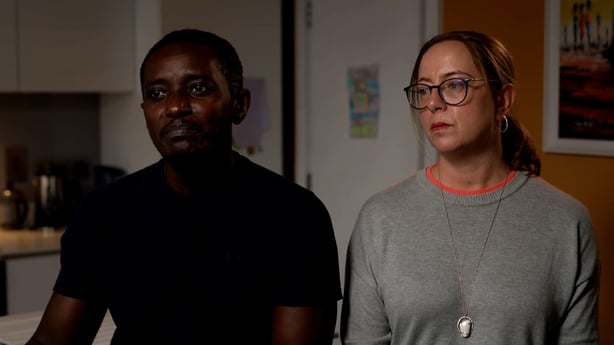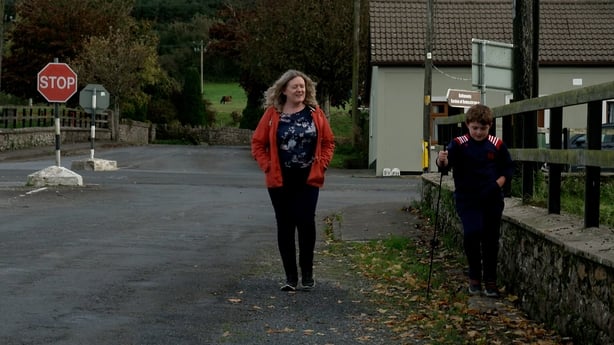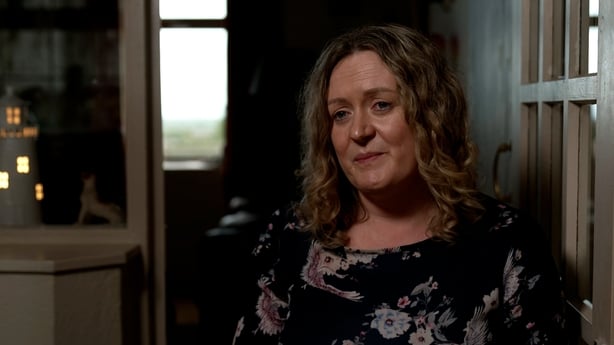From welfare increases, tax rate changes and once-off energy credits, Government ministers say Budget 2024 was focused at easing the cost-of-living crisis for households across the country.
Prior to the Budget, Prime Time spoke with the Kielys and the Yeboahs to get a sense of their financial situations and concerns, and in the wake of the ministerial speeches on Tuesday, accountments at KPMG crunched the numbers for them.
So how did families like theirs fare?
The Yeboahs

The Yeboahs describe themselves as an "average middle-income family." Denise O'Connor is a teacher and her husband Fred Yeboah is a manager in Dunnes Stores. They live in north County Dublin, with their eight-year-old son and 12-year-old daughter.
They say, combined, they're on an average household income but that once all their outgoings are paid, including their mortgage, car loan, and health insurance, they are left with very little at the end of the month for non-essentials.
"As soon as my salary comes in, I have money for about half an hour and then it's all gone," Denise said.
The Yeboahs say they feel pressure to be able to afford additional "little things like putting your kids into activities."
"People think that's just a given - that you're parents and you're a terrible parent if your kids are not doing everything," Denise says.
The Yeboahs say the cost for everything is more expensive now and particularly for "middle families" who don’t qualify for financial assistance.
"You can't apply for any money, you can't get supplements, you know, you're paying full money for GPs. We don’t get anything off," Denise says.
With very little to put in savings, the Yeboahs worry about potential surprise expenses.
"We feel we're being penalised for doing all the work and paying all the taxes. And we just feel that it's time that our taxes were reduced a little bit more money in our pockets."
Fred and Denise are on a fixed-rate mortgage but say they are "terrified" for when that fixed rate term ends.
"We're just hoping by the time that comes round... there'll be some mortgage relief or something will happen with the interest rates," Denise says.
So, will the Yeboahs have more to put away for a rainy day following Budget 24?
Impact of Budget 24
Tax experts from KPMG considered all the measures announced and say the Yeboahs will be up €2,711 next year.
Tax-wise, they will benefit from the widening of the standard income tax rate to €42,000.
They’ll also benefit from personal, employee PAYE and earned income tax credits being increased by €100 each, as well as the widening of the 2% Universal Social Charge (USC) band and the reduction of the USC rate from 4.5% to 4%.
The Yeboahs will pay a little extra due to Pay Related Social Insurance (PRSI) contribution rates, which will increase 0.1% from 1 October next year.
In terms of one-off payments, KPMG say the Yeboahs will get a bonus child benefit payment for their two children, as well as energy credits, and secondary school books for their daughter.
Speaking on Prime Time’s Budget 2024 special, Denise said there were some measures in the Budget that were "great" and that time would tell how her family might benefit from them.
However, she said she hoped there would be more to tackle the cost-of-living crisis.
"We’ll have extra money, but the costs are just so high for everything. I don’t see how that’s really going to help us in terms of paying for the extra diesel, the kids’ activities, the GPs and the dental," Denise said.
While Denise remained optimistic overall, Fred was less so. He welcomed the one-off payments announced by the Government but was also sceptical of them.
"It’s a one-off payment. Thank God it comes to my pocket, I spend it, and then what?"
Referencing the fuel excise charges to be introduced next April, Fred said the Government were "giving money to me on my left hand and taking it on the right."
In response to Fred’s comments, Minister for Finance Michael McGrath said the Government was not "taking away with the other hand."
"What we are trying to do across the board is to push down costs that individuals and families are facing, whether it be in childcare, in healthcare, in education, in transport; we’re trying to reduce costs because we know people are squeezed," Minister McGrath said.
The Kielys

Maeve Kiely is a lone parent; she lives with her eight-year-old son Conor in Co Tipperary. She’s a homeowner and works five days a week as a pharmacy technician. She says she is staying afloat on her wages alone and does not receive any benefits from the State.
Her biggest outgoing is the home heating oil. It costs Maeve nearly €400 for 300 litres of kerosene. An average boiler will burn between 3-4 litres per hour, depending on its size.
Although Maeve is managing on one income, she is concerned about not having the funds to front any unexpected costs that may arise in the future.
"I worry if I have any big outgoings or surprise outgoings coming up," she told Prime Time.
Maeve says when all bills and outgoings are paid, there’s not much left for her and her son for things like holidays.
"We went away for one day really this year as a family. But after that, I just don't see anything else aside of after paying bills. Really, that's all there is," she says.

With an expensive festive season coming up, Maeve is even more anxious about her finances and the impact on her son.
"I feel like I'm depriving him of certain things and then Christmas is coming up as well. That's another worry as well that I want to make sure that he gets what he deserves."
But the budget will offer some measure of relief for Maeve, KPMG says, and in time for Christmas, with the bonus child benefit of €140 and energy credits of €450 for three individual bills.
In terms of her taxes, KPMG said Maeve will benefit from personal, employee PAYE and earned income tax credits being increased by €100 each, as well as the widening of the USC band and the reduction of the USC rate from 4.5% to 4%.
All in all, taking into account the slight increase in PRSI rate next October, Maeve will be up €974 this year.
Speaking on Prime Time, Head of Tax at KPMG Tom Woods added that Maeve could be eligible for additional supplemental payments, including the working family payment and the back-to-school allowance, which would add €4,776 to her savings next year.
In response, Maeve said she was taken aback and didn't realise she might qualify for these additional payments.







